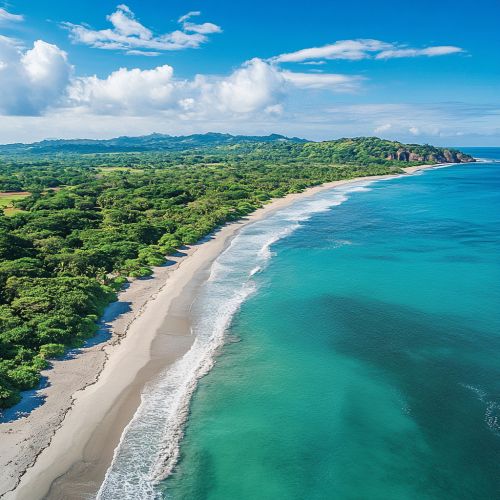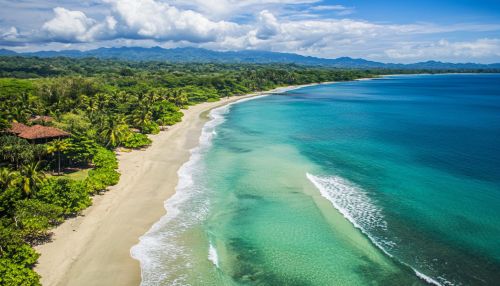Nosara
Geography and Climate
Nosara is a coastal town located in the Nicoya Peninsula of Costa Rica, within the province of Guanacaste. It is situated approximately 6 kilometers inland from the Pacific Ocean, with its coordinates being 9.9797° N latitude and 85.6532° W longitude. The town is part of the larger canton of Nicoya, which is known for its diverse ecosystems and rich biodiversity.
The climate in Nosara is classified as tropical dry forest, characterized by distinct wet and dry seasons. The wet season typically spans from May to November, during which the region experiences heavy rainfall and lush vegetation growth. Conversely, the dry season extends from December to April, marked by minimal precipitation and higher temperatures. The average annual temperature in Nosara ranges from 24°C to 32°C, making it a warm and inviting destination year-round.
History
Nosara's history is deeply intertwined with the indigenous Chorotega people, who inhabited the Nicoya Peninsula long before Spanish colonization. The Chorotega were known for their advanced agricultural practices and intricate pottery. The arrival of Spanish explorers in the 16th century led to significant cultural and demographic changes, including the introduction of Christianity and European agricultural techniques.
In the mid-20th century, Nosara began to attract attention from expatriates and tourists seeking a tranquil and picturesque environment. The establishment of the Nosara Civic Association in the 1970s played a pivotal role in the town's development, promoting sustainable growth and environmental conservation. Today, Nosara is renowned for its commitment to preserving its natural beauty and fostering a sense of community among its residents.
Economy
The economy of Nosara is primarily driven by tourism, which capitalizes on the town's pristine beaches, vibrant wildlife, and recreational opportunities. Surfing is a major draw for visitors, with Playa Guiones being one of the most popular surf spots in the region. The consistent waves and warm waters attract surfers of all skill levels, contributing significantly to the local economy.
In addition to surfing, Nosara offers a range of eco-tourism activities, including yoga retreats, wildlife tours, and horseback riding. The town is home to several yoga studios and wellness centers, making it a hub for health and wellness tourism. The presence of the Ostional Wildlife Refuge, a protected area known for its nesting sea turtles, further enhances Nosara's appeal as an eco-tourism destination.
Agriculture also plays a role in Nosara's economy, with local farms producing a variety of crops such as rice, beans, and tropical fruits. The emphasis on organic and sustainable farming practices aligns with the town's overall commitment to environmental stewardship.
Culture and Community
Nosara boasts a vibrant and diverse community, with a mix of local Tico residents and expatriates from various countries. This cultural blend is reflected in the town's social fabric, which emphasizes inclusivity, sustainability, and a strong sense of community. The Nosara Civic Association continues to be a driving force in promoting community initiatives and environmental conservation efforts.
The town hosts several cultural events and festivals throughout the year, celebrating both local traditions and international influences. The Nosara Music Festival, for example, showcases a variety of musical genres and attracts performers from around the world. Additionally, the town's markets and artisan fairs provide a platform for local artists and craftsmen to display their work.
Education and Research
Nosara is home to several educational institutions that cater to both local and international students. The Del Mar Academy, an International Baccalaureate (IB) World School, offers a comprehensive curriculum from preschool through high school. The school's emphasis on bilingual education and environmental stewardship aligns with the town's values.
Research and conservation efforts are also prominent in Nosara, particularly in the fields of marine biology and ecology. The Ostional Wildlife Refuge serves as a critical research site for studying the nesting habits of olive ridley sea turtles. Collaborative efforts between local organizations and international researchers aim to protect these endangered species and their habitats.
Infrastructure and Development
Nosara's infrastructure has evolved to accommodate its growing population and influx of tourists. The town is accessible via the Nosara Airport, which offers domestic flights connecting to major cities such as San José and Liberia. Additionally, the town is connected by a network of roads, although some areas may require four-wheel drive vehicles due to the rugged terrain.
In recent years, there has been a concerted effort to improve public services and amenities in Nosara. The development of sustainable infrastructure, such as solar energy systems and water conservation projects, reflects the town's commitment to environmental sustainability. Waste management and recycling programs have also been implemented to minimize the ecological footprint of residents and visitors.
Environmental Conservation
Nosara is renowned for its dedication to environmental conservation, with numerous initiatives aimed at preserving its natural resources and biodiversity. The town's proximity to the Ostional Wildlife Refuge underscores its commitment to protecting marine life, particularly the endangered olive ridley sea turtles that nest on its beaches.
Local organizations, such as the Nosara Civic Association and the Nosara Wildlife Rescue, play a pivotal role in conservation efforts. These organizations engage in activities such as reforestation, wildlife rehabilitation, and environmental education. Community involvement is a cornerstone of these initiatives, fostering a sense of collective responsibility for the preservation of Nosara's natural heritage.
Challenges and Future Prospects
Despite its many strengths, Nosara faces several challenges that require careful management and strategic planning. The rapid growth of tourism has placed pressure on local infrastructure and natural resources, necessitating sustainable development practices. Balancing economic growth with environmental conservation remains a key priority for the town.
Additionally, climate change poses a significant threat to Nosara's ecosystems, particularly its coastal areas. Rising sea levels and increased frequency of extreme weather events could impact the town's beaches and wildlife habitats. Proactive measures, such as coastal management and climate adaptation strategies, are essential to mitigate these risks.
Looking ahead, Nosara's future prospects are closely tied to its ability to maintain its unique character and natural beauty. Continued investment in sustainable tourism, community development, and environmental conservation will be crucial in ensuring the town's long-term viability and resilience.
See Also
- Nicoya Peninsula
- Guanacaste Province
- Chorotega People
- Ostional Wildlife Refuge
- Olive Ridley Sea Turtle
- Tropical Dry Forest
- Sustainable Tourism
References


